Authors & editors
ANU Press has collaborated with a diverse range of authors and editors across a wide variety of academic disciplines. Browse the ANU Press collection by author or editor.

Assessing the Evidence on Indigenous Socioeconomic Outcomes »
A focus on the 2002 NATSISS
Edited by: Boyd Hunter
Publication date: June 2006
This monograph presents the peer-reviewed proceedings of the CAEPR conference on Indigenous Socioeconomic Outcomes: Assessing Recent Evidence, held at The Australian National University in August 2005. It presents the latest evidence on Indigenous economic and social status, and family and community life, and discusses its implications for government policy.
The main focus of this volume is on analysing the 2002 National Aboriginal and Torres Strait Islander Social Survey (NATSISS) outputs and issues about how to interpret the data. It also offers some assessment of changes in Indigenous social conditions over time and examines how Indigenous people fared vis-à-vis other Australians in other statistical collections. The discussion of the broad Indigenous policy context by three prominent Indigenous Australians—Larissa Berhendt, Tom Calma, and Geoff Scott—explores different perspectives.

Humanities Research: Volume XII. No. 1. 2005 »
Bigotry and Religion in Australia 1865- 1950
Edited by: Benjamin Penny
Publication date: May 2006
Humanities Research is an internationally peer-reviewed journal published by the Research School of Humanities at The Australian National University. The Research School of Humanities came into existence in January 2007 and consists of the Humanities Research Centre, Centre for Cross-Cultural Research, National Europe Centre and Australian National Dictionary Centre. Launched in 1997, issues are thematic with guest editors and address important and timely topics across all branches of the humanities.
This collection of essays examines manifestations of bigotry on the basis of religion in the period from the latter part of the nineteenth century until the aftermath of the second world war. It includes articles concerning both prejudice directed against one religious group as in the case of anti-semitism, as well as inter-religious bigotry, particularly conflict between Protestant and Catholic Christians. Some papers address specific incidents that took place under very particular local conditions while others analyse patterns of discrimination over the broad sweep of time; some examine prejudice in face-to-face situations and others in academic discourse. In other words, we have attempted to include as many different manifestations of the many tentacled beast that is religious bigotry as we have been able. In this way we hope to bring into clearer focus the situation in present-day Australian society, to trace important social changes, to provide historical contexts for current manifestations of religious prejudice, and to examine specific incidents or practices, or patterns of discrimination and prejudice, in our past.
This issue of Humanities Research is sponsored by the Herbert and Valmae Freilich Foundation, a part of the Humanities Research Centre of ANU devoted to research into all forms of prejudice and discrimination.
Download for free
Not available for purchase
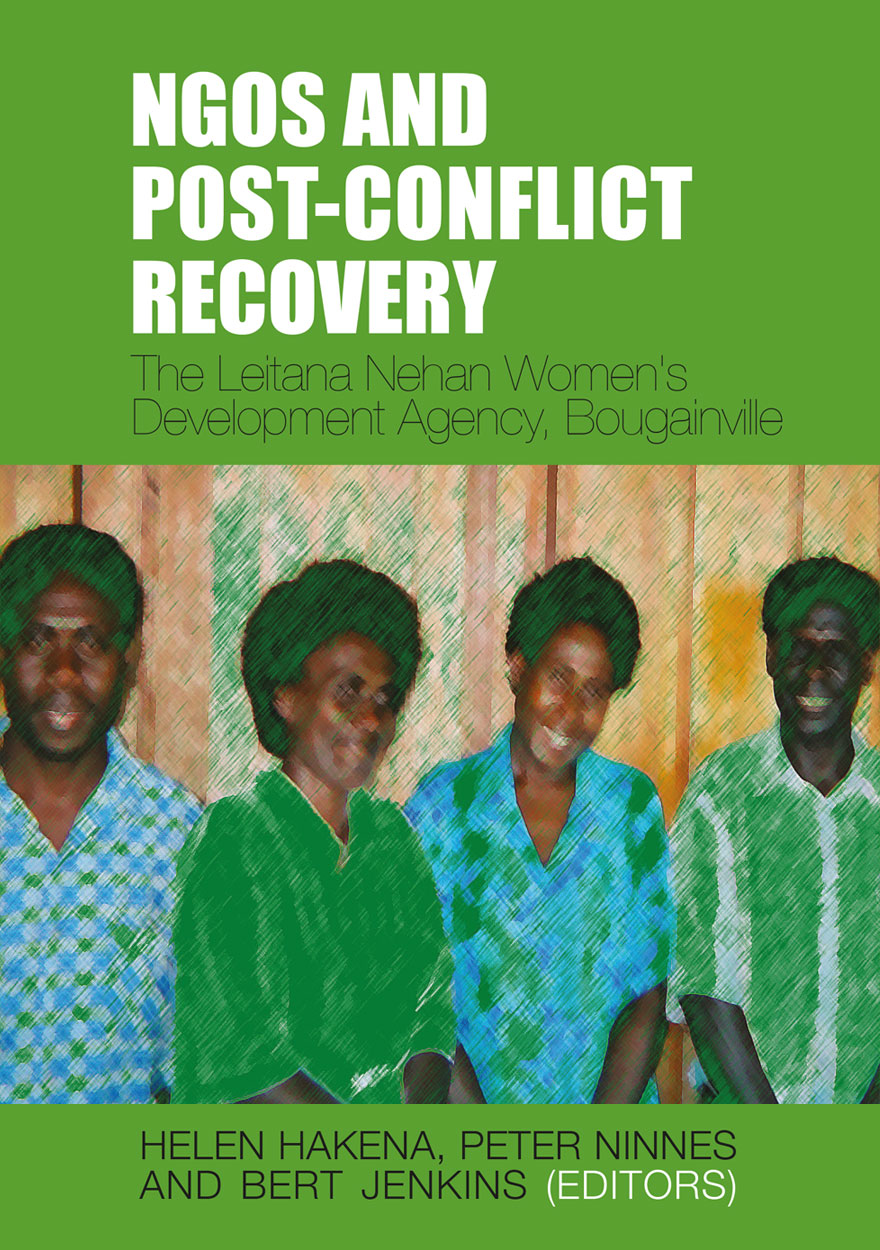
NGOs and Post-Conflict Recovery »
The Leitana Nehan Women’s Development Agency, Bougainville
Edited by: Helen Hakena, Peter Ninnes, Bert Jenkins
Publication date: April 2006
When government services have broken down or when international nongovernment organisations are uninterested or unable to help, grassroots non-government organisations provide important humanitarian, educational and advocacy services. Yet, too often the story of the crucial role played by these organisations in conflict and post-conflict recovery goes unheard.
The Leitana Nehan Women’s Development Agency provides many salutary lessons for grassroots non-government organisations undertaking peacemaking and peace-building work. In the thirteen years of its existence, it has contributed humanitarian assistance, provided education programs on peace, gender issues and community development, and has become a powerful advocate for women’s and children’s rights at all levels of society. Its work has been recognised through the award of a United Nations’ Millennium Peace Price in 2000 and a Pacific Peace Prize in 2004.
This book makes a unique contribution to understanding the role of nongovernment organisations in promoting peace and development and gender issues in the South West Pacific.

Giblin's Platoon »
The trials and triumph of the economist in Australian public life
Publication date: April 2006
Around 1920 there formed a friendship of four men who were to be at the heart of Australian economic thought and policy-making over the next 30 years: L.F. Giblin, J.B. Brigden, D.B. Copland and Roland Wilson.
This book tells their story. As economists, they were to become key figures in the debates of the day, staking sometimes controversial positions on protectionism, central banking, industrial relations, and federalism. As public figures they were at the hub of several events punctuating their times: the Premiers’ Plan of 1931, the Bretton Woods conference of 1944, and the inauguration of the United Nations in San Francisco in 1945. As leading public intellectuals, they spoke out on censorship, appeasement and defence. As four men who really counted in Australian public life, they were decisive in the establishment of The Australian National University, the Commonwealth Grants Commission, and the modern form of the Australian Public Service and the Australian Bureau of Statistics.
Giblin’s Platoon comprehends the personal and intellectual dimensions of their lives, as well as depicting them in political and cultural contexts. It recounts their chequered relations with Jack Lang, John Curtin, S.M. Bruce, R.G. Menzies, and J.B. Chifley, as well as their encounters with the Bloomsbury group, Joseph Conrad of the Jindyworobaks, and William Dobell.

El Lago Español »
Authored by: O.H.K. Spate
Publication date: April 2006
En sentido estricto, “el Pacífico” no existió como tal hasta que en 1520-21 Fernao de Magalhãis, más conocido como Magallanes, atravesó la enorme extensión de aguas que entonces recibieron su nombre». Con estas palabras, el historiador y geógrafo de origen británico Oskar Spate presenta su versión del proceso en el que ese inmenso vacío se transforma en centro de las relaciones globales. El lago español describe el éxito esencialmente europeo y americano en convertir ese espacio en el nexo del poder económico y militar.
Este trabajo es una historia del Pacífico, el océano que se convirtió en el escenario del poder y el conflicto conformado por la política de Europa y el contexto económico de la América española. Sólo podía haber un concepto de «el Pacífico» una vez establecido el límite y el contorno del océano y esto era, indudablemente, trabajo de europeos. Cincuenta años después de la Conquista, Nueva España y Perú fueron la base desde donde el océano conformó virtualmente un lago español.

Connected Worlds »
History in Transnational Perspective
Edited by: Ann Curthoys, Marilyn Lake
Publication date: March 2006
This volume brings together historians of imperialism and race, travel and modernity, Islam and India, the Pacific and the Atlantic to show how a ‘transnational’ approach to history offers fresh insights into the past. Transnational history is a form of scholarship that has been revolutionising our understanding of history in the last decade. With a focus on interconnectedness across national borders of ideas, events, technologies and individual lives, it moves beyond the national frames of analysis that so often blinker and restrict our understanding of the past. Many of the essays also show how expertise in ‘Australian history’ can contribute to and benefit from new transnational approaches to history. Through an examination of such diverse subjects as film, modernity, immigration, politics and romance, Connected Worlds weaves an historical matrix which transports the reader beyond the local into a realm which re-defines the meaning of humanity in all its complexity. Contributors include Tony Ballantyne, Desley Deacon, John Fitzgerald, Patrick Wolfe and Angela Woollacott.
At the XIII Biennial Conference of The Film and History Association of Australia and New Zealand, Jill Julius Matthews was presented with an award for Best Book Chapter: ‘Modern nomads and national film history: the multi-continental career of J. D. Williams’ in Ann Curthoys and Marilyn Lake (eds), Connected Worlds: History in Transnational Perspective, Canberra: ANU E Press, 2006, pp. 157-169

Dislocating the Frontier »
Essaying the Mystique of the Outback
Edited by: Deborah Bird Rose, Richard Davis
Publication date: March 2006
The frontier is one of the most pervasive concepts underlying the production of national identity in Australia. Recently it has become a highly contested domain in which visions of nationhood are argued out through analysis of frontier conflict.
Dislocating the Frontier departs from this contestation and takes a critical approach to the frontier imagination in Australia. The authors of this book work with frontier theory in comparative and unsettling modes. The essays reveal diverse aspects of frontier images and dreams – as manifested in performance, decolonising domains, language, and cross-cultural encounters.
Dislocating the Frontier takes readers beyond the notion of a progressive or disastrous frontier to a more radical rethinking of the frontier imagination itself.

Aboriginal History Journal: Volume 30 »
Publication date: 2006
Since 1977, the journal Aboriginal History has pioneered interdisciplinary historical studies of Australian Aboriginal people’s and Torres Strait Islander’s interactions with non-Indigenous peoples. It has promoted publication of Indigenous oral traditions, biographies, languages, archival and bibliographic guides, previously unpublished manuscript accounts, critiques of current events, and research and reviews in the fields of anthropology, archaeology, sociology, linguistics, demography, law, geography and cultural, political and economic history.
Aboriginal History Inc. is a publishing organisation based in the Australian Centre for Indigenous History, Research School of Social Sciences, The Australian National University, Canberra.
For more information on Aboriginal History Inc. please visit aboriginalhistory.org.au.
Download for free
Not available for purchase

Indigenous People and the Pilbara Mining Boom »
A baseline for regional participation
Authored by: John Taylor, B. Scambary
Publication date: January 2006
The largest escalation of mining activity in Australian history is currently underway in the Pilbara region of Western Australia. Pilbara-based transnational resource companies recognise that major social and economic impacts on Indigenous communities in the region are to be expected and that sound relations with these communities and the pursuit of sustainable regional economies involving greater Indigenous participation provide the necessary foundations for a social licence to operate.
This study examines the dynamics of demand for Indigenous labour in the region, and the capacity of local supply to respond. A special feature of this study is the inclusion of qualitative data reporting the views of local Indigenous people on the social and economic predicaments that face them.
The basic message conveyed is that little has been achieved over the past four decades in terms of enhancing Indigenous socioeconomic status in the Pilbara. On the basis of planned economic development and corporate interest in pursuing Indigenous engagement, progress is now possible but major efforts are required from all interested stakeholders (Indigenous organisations, miners and governments) in order to ensure that this occurs.

Rule of Law, Legitimate Governance & Development in the Pacific »
Authored by: Iutisone Salevao
Publication date: December 2005
The notion that the rule of law embodies or guarantees all the essential requirements for a perfectly just society is extravagant and naïve. Nonetheless, the rule of law remains an essential human virtue whose usefulness the world has yet to outgrow. Using the rule of law as a mobilising theme, this book recasts Western theories of law, good governance and development in a Pacific perspective. While Iutisone Salevao works primarily within a legal analytical framework, he employs a multifaceted approach to address the challenge of making Western theories relevant to the concrete and normative contexts of the Pacific peoples, and to accommodate Pacific values, ideologies, structures and practices within the modern discourse on law.

In the Service of the Company- Vol 1 »
Letters of Sir Edward Parry, Commissioner to the Australian Agricultural Company
Publication date: November 2005
Sir Edward Parry’s correspondence and record keeping as Commissioner to the Australian Agricultural Company were voluminous. His letterbooks, reproduced as In the Service of the Company Vol. I and Vol. II, form part of his lengthy despatches to the Directors in England.
The extensive archives of the Australian Agricultural Company, including the records of both the London and Australian head offices, have since 1955 been deposited with the Noel Butlin Archives Centre at The Australian National University.
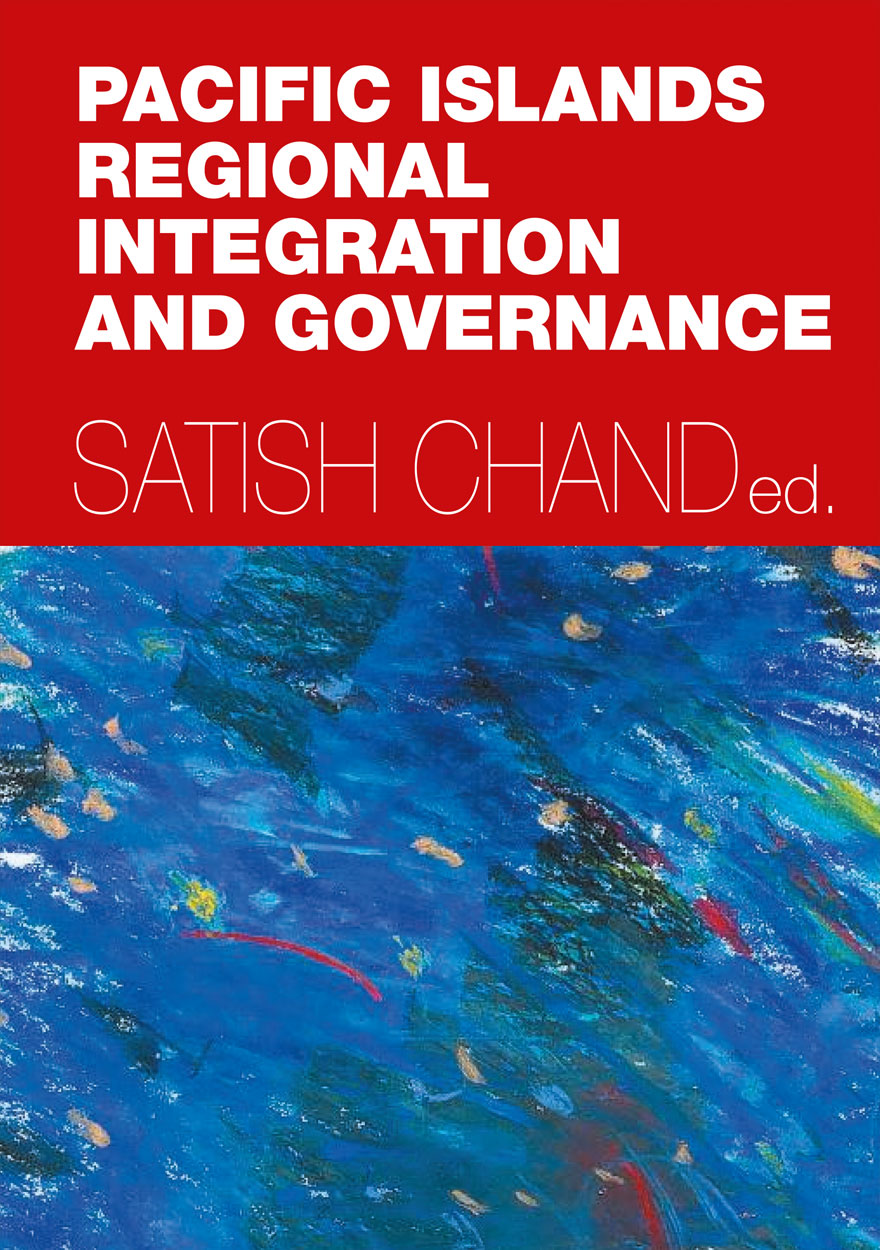
Pacific Islands Regional Integration and Governance »
Edited by: Satish Chand
Publication date: November 2005
This book brings together experts from around the world to consider specific issues pertaining to regional integration and governance within small states. The authors collectively address the challenges posed to small states by the quickened pace of globalisation. The lessons learnt from the experiences of small states are then used to draw policy lessons for the Pacific island countries.
Pacific Islands Regional Integration and Governance will be of interest and relevance to academics and advanced students of the Pacific, its history and current challenges, as well as the general reader who has an interest in the area.

The China Boom and its Discontents »
Edited by: Ross Garnaut, Ligang Song
Publication date: October 2005
China is shaping the global economy as never before. An insatiable demand for commodities, energy resources and capital, and deepening integration to the world economy has won China acclaim. Yet 25 years of rapid industrial development, far-reaching economic reforms and increasing international competition have also created an array of challenging domestic policy demands.
The China Boom and its Discontents discusses the financial and social challenges that have emerged in the wake of rapid economic growth. Recent research on demographic trends, labour movements, financial development, social security, urbanisation and trade agreements highlight the unfinished progress of reforms in China.

Pacific Regional Order »
Authored by: Dave Peebles
Publication date: October 2005
The way ahead …
New policies are needed if the Pacific is to realise its potential as a peaceful, prosperous region, where the Pacific’s citizens enjoy good standards of health and education, long lives and many opportunities; where Pacific economic growth is constantly improving, driven by environmentally sustainable service industries; where coups, civil conflict and the dangers of failed states have been relegated to the past; where the Pacific is integrated into the wider region, and is an influential voice in world affairs.
This timely book argues that Pacific countries including Australia, need to embrace regional integration to realise this vision. The book sets out a comprehensive plan for realising a Pacific regional community dedicated to promoting sustainable development, security, human rights, the rule of law and democracy.

Asian Socialism and Legal Change »
The dynamics of Vietnamese and Chinese Reform
Edited by: John Gillespie, Pip Nicholson
Publication date: August 2005
Although the immense process of economic and social transformation currently underway in China and Vietnam is well known, less attention has been devoted to the process of Chinese and Vietnamese legal change.
Asian Socialism and Legal Change brings together experts to analyse recent developments in the legal sphere, representing the diversity and dynamism of this process. This book is the first systematic analysis of legal change in Asian transitional economies.

Ethics and Auditing »
Edited by: Tom Campbell, Keith Houghton
Publication date: June 2005
Ethics and Auditing examines ethical challenges exposed by recent accounting and auditing ‘lapses’ through a study of interconnected moral, legal and accounting issues. The book aims to engage a broad readership in the discussion of audit failure and reform.
With its range of intellectual and practical perspectives, Ethics and Auditing provides critical analyses of auditor independence, conflicts of interest, self-regulation, the setting and enforcing of auditing standards, and ethics education.
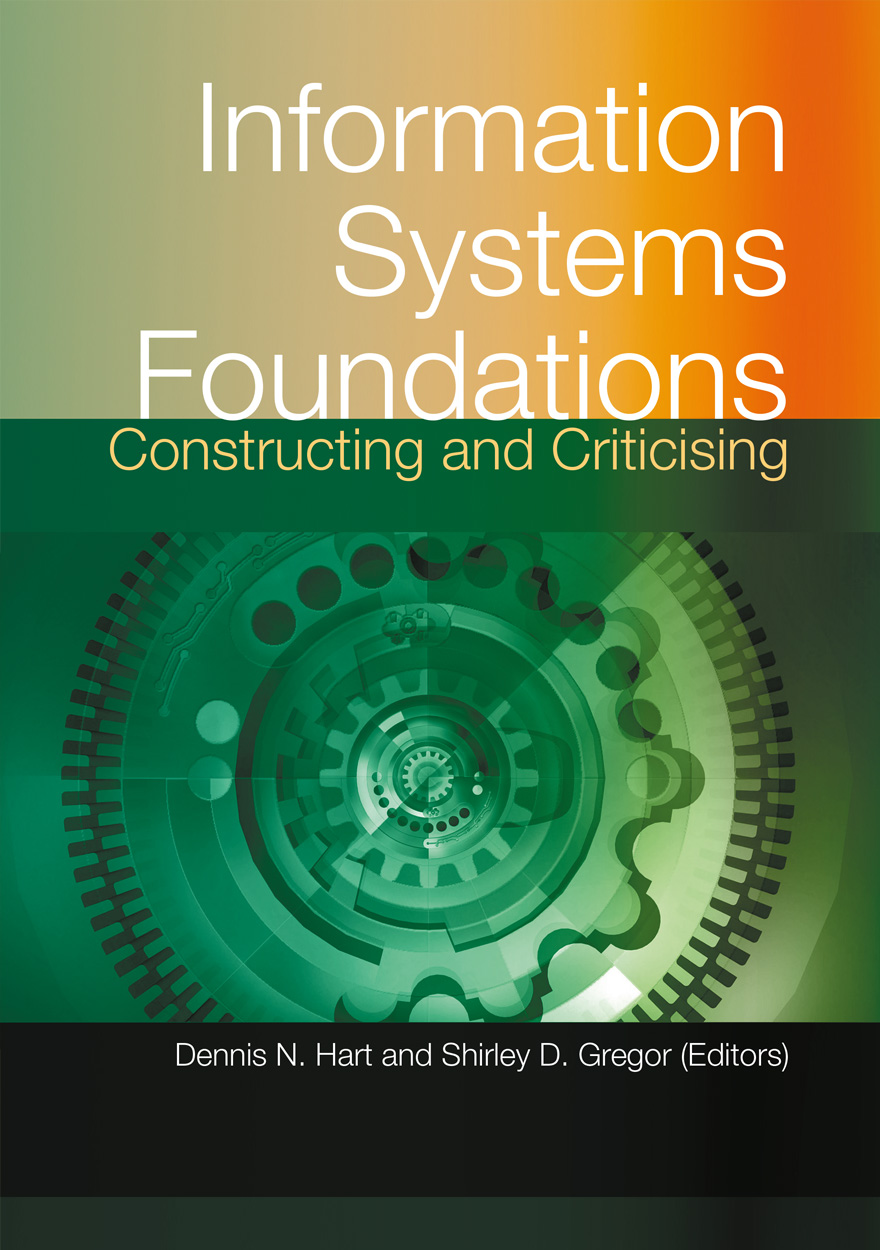
Information Systems Foundations: Constructing and Criticising »
Edited by: Dennis Hart, Shirley Gregor
Publication date: June 2005
This volume contains the papers presented at the second biennial Information Systems Foundations (‘Constructing and Criticising’) Workshop, held at The Australian National University in Canberra from 16-17 July 2004. The focus of the workshop was, as for the first in the series, the foundations of Information Systems as an academic discipline. The particular emphasis was on the adequacy and completeness of theoretical underpinnings and the research methods employed. At the same time the practical nature of the applications and phenomena with which the discipline deals were kept firmly in view. The papers in this volume range from the unashamedly theoretical (‘The Struggle Towards an Understanding of Theory in Information Systems’) to the much more practically oriented (‘A Procedural Model for Ontological Analyses’).
The contents of this volume will be of interest and relevance to academics and advanced students as well as thoughtful and reflective practitioners in the Information Systems field.
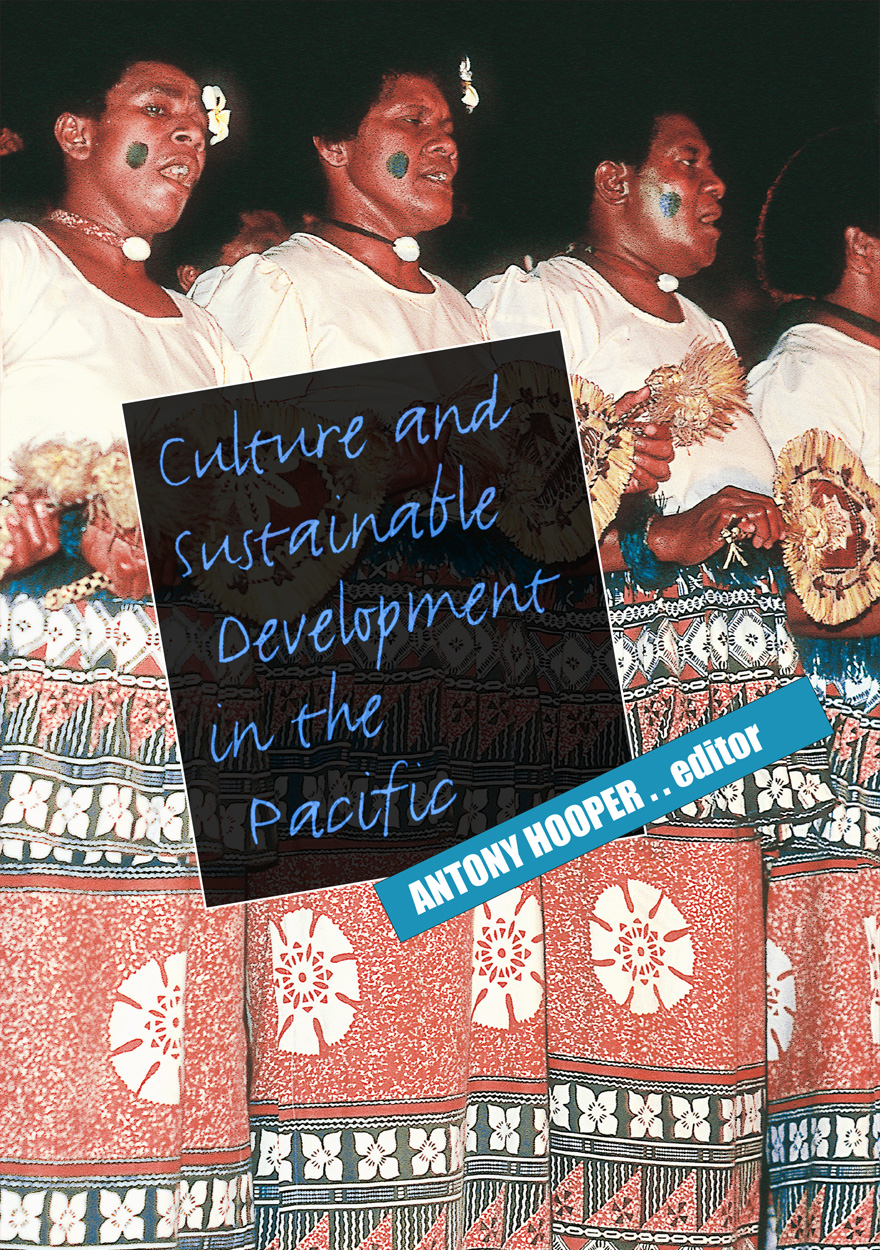
Culture and Sustainable Development in the Pacific »
Edited by: Antony Hooper
Publication date: April 2005
Throughout the South Pacific, notions of ‘culture’ and ‘development’ are very much alive—in political debate, the media, sermons, and endless discussions amongst villagers and the urban élites, even in policy reports.
Often the terms are counterposed, and development along with ‘economic rationality’, ‘good governance’ and ‘progress’ is set against culture or ‘custom’, ‘tradition’ and ‘identity’. The decay of custom and impoverishment of culture are often seen as wrought by development, while failures of development are haunted by the notion that they are due, somehow, to the darker, irrational influences of culture.
The problem is to resolve the contradictions between them so as to achieve the greater good—access to material goods, welfare and amenities, ‘modern life’—without the sacrifice of the ‘traditional’ values and institutions that provide material security and sustain diverse social identities.
Resolution is sought in this book by a number of leading writers from the South Pacific including Langi Kavaliku, Epeli Hau’ofa, Marshall Sahlins, Malama Meleisea, Joeli Veitayaki, and Tarcisius Tara Kabutaulaka. The volume is brought together for UNESCO by Antony Hooper, Professor Emeritus at the University of Auckland. UNESCO experts include Richard Engelhardt, Langi Kavaliku, Russell Marshall, Malama Meleisea, Edna Tait and Mali Voi.

Aboriginal History Journal: Volume 29 »
Publication date: 2005
Since 1977, the journal Aboriginal History has pioneered interdisciplinary historical studies of Australian Aboriginal people’s and Torres Strait Islander’s interactions with non-Indigenous peoples. It has promoted publication of Indigenous oral traditions, biographies, languages, archival and bibliographic guides, previously unpublished manuscript accounts, critiques of current events, and research and reviews in the fields of anthropology, archaeology, sociology, linguistics, demography, law, geography and cultural, political and economic history.
Aboriginal History Inc. is a publishing organisation based in the Australian Centre for Indigenous History, Research School of Social Sciences, The Australian National University, Canberra.
For more information on Aboriginal History Inc. please visit aboriginalhistory.org.au.
Download for free
Not available for purchase
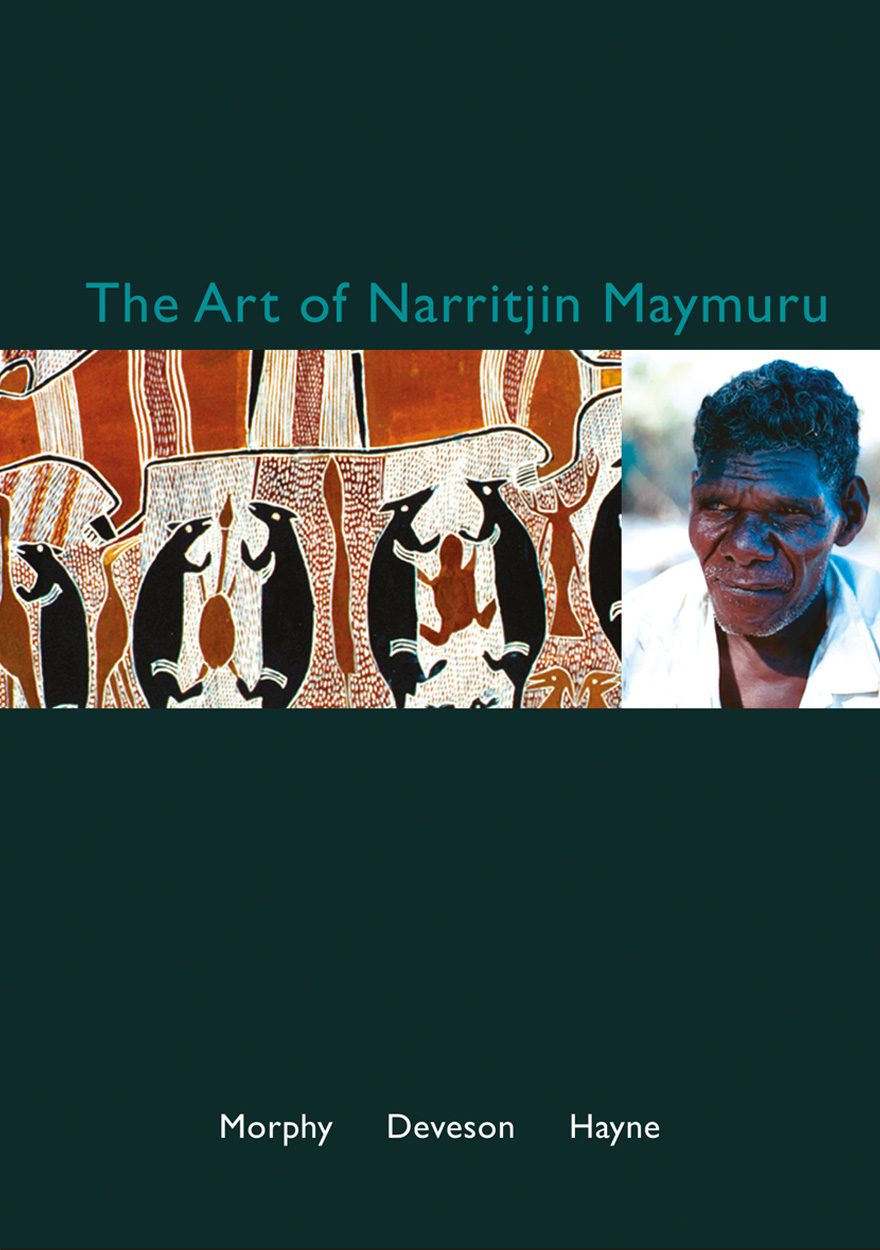
The Art of Narritjin Maymuru »
Publication date: January 2005
Narritjin Maymuru led a life that was as extraordinary and adventurous as that of any Australian artist of the twentieth century. Howard Morphy, with the help of Pip Deveson, has scoured the collections of museums, art galleries and private collections around the world to bring together an archive of Narritjin’s paintings and carvings spanning nearly forty years of his work.
The Art of Narritjin Maymuru enables you to explore his art. You can begin either by following the timeline that summarises the main biographical features of Narritjin’s life or by moving straight into the sets of paintings.
The Art of Narritjin Maymuru is currently unavailable for purchase due to technical issues. We hope to offer an online version of this work in the near future.
CD currently unavailable. We apologise for any inconvenience.
Reviews of the publication
Francoise Dussart, American Anthropologist, June 2007, Vol. 109, No. 2, pp. 363-364
John E. Stanton, Australian and New Zealand Journal of Art, Volume 7, Number 2, 2006
Charlotte Townsend-Gault, Visual Anthropology Review, Fall 2006, Vol. 22, No. 2, pp. 80-82
Not available for purchase
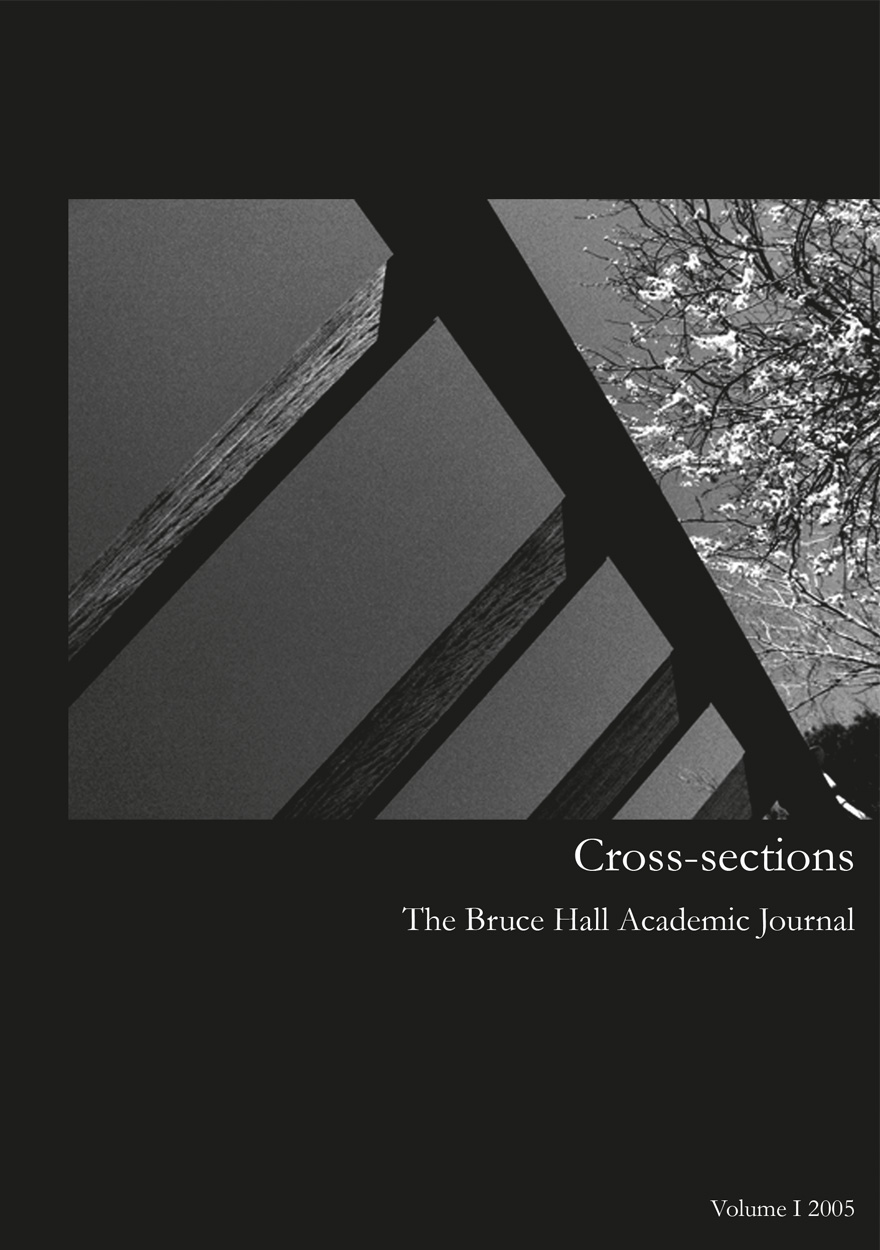
Cross-sections, The Bruce Hall Academic Journal: Volume I, 2005 »
Publication date: 2005
Representing the combined energies of a large group of authors, editors, artists and researchers associated with Bruce Hall at the ANU, Cross-sections collects a range of works (from academic articles and essays to photography, digital art and installation artwork) that represents the disciplinary breadth and artistic vitality of the ANU.
Presenting a challenging and absorbing way for students to hone vital research skills, in the process, Cross-sections nurtures a fruitful environment of collaborative interaction between academics and students.
Download for free
Not available for purchase
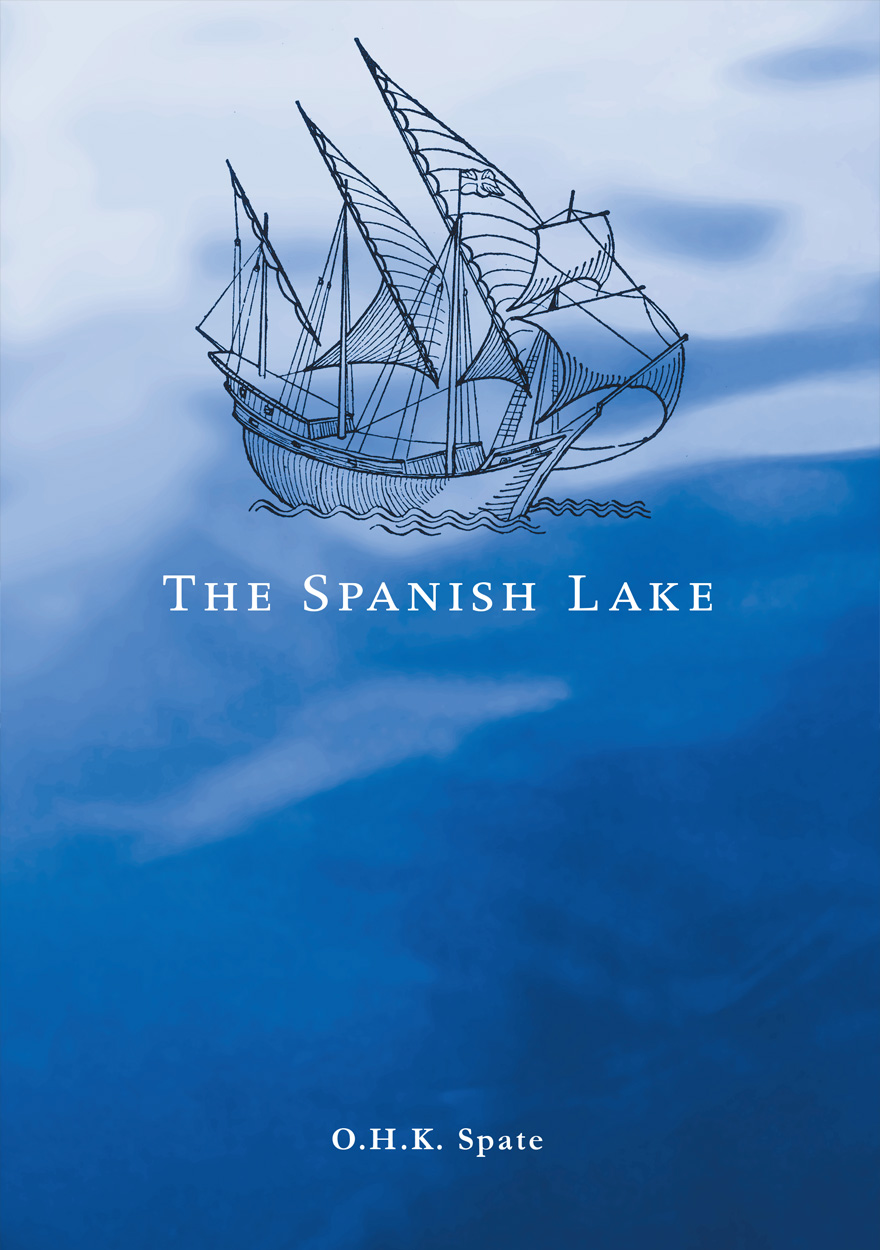
The Spanish Lake »
Authored by: O.H.K. Spate
Publication date: November 2004
‘Strictly speaking, there was no such thing as “the Pacific” until in 1520-1 Fernao de Magalhãis, better known as Magellan, traversed the huge expanse of waters, which then received its name.’
With these opening words, Oskar Spate launches his account of the process by which the greatest blank on the map became a focus of global relations. The Spanish Lake describes the essentially European and American achievement of turning this emptiness into a nexus of economic and military power.
This work is a history of the Pacific, the ocean that became a theatre of power and conflict shaped by the politics of Europe and the economic background of Spanish America. There could only be a concept of ‘the Pacific’ once the limits and lineaments of the ocean were set and this was undeniably the work of Europeans. Fifty years after the Conquista, Nueva España and Peru were the bases from which the ocean was turned into virtually a Spanish lake.
Oskar Spate was born and educated in England where he completed a doctorate at the University of Cambridge in 1937 on the development of London. After the Second World War he combined lecturing in England with writing a regional geography of the Indian sub-continent.
In 1951 he took up the post of Foundation Professor of Geography in the Research School of Pacific Studies at The Australian National University, a position he held until 1967. From 1967 to 1972 he was Director of the Research School of Pacific Studies, ANU, and in 1972 moved to its Department of Pacific History.
Throughout his career, Oskar Spate published a wide diversity of papers and essays on such subjects as the geography of Europe, South Asia and Australia and the exploration of Australia and the Pacific. Upon his retirement in 1976, he devoted most of his energies to researching and writing his three-volume history The Pacific since Magellan.

Social Indicators for Aboriginal Governance »
Insights from the Thamarrurr Region, Northern Territory
Authored by: John Taylor
Publication date: October 2004
John Taylor is a Senior Fellow at the Centre for Aboriginal Economic Policy Research, The Australian National University, Canberra.
The Council of Australian Governments is trialing Indigenous Community Coordination Pilot schemes around the country aimed at fostering whole-of-government approaches to service delivery and development. A notable example is in the Thamarrurr region of the Northern Territory focused on the Aboriginal town of Wadeye and its hinterland. Under new governance arrangements the Thamarrurr Regional Council has identified a need to profile existing social and economic conditions as a basis for its current planning and future evaluation.
This study provides an innovative template for such profiling. With substantial input from local people it uncovers a region of high population growth with major challenges in areas of employment, income, education and training, housing and infrastructure, health status and criminal justice. It yields a baseline of available data to assist discussions of regional needs, aspirations and development capacities. By using population projections, it shifts government and community thinking away from reactive responses to historic need, to a more pro-active future-oriented approach to development.
The Thamarrurr people view this document as an important planning tool for their people. Their aim is to have the same access to services and opportunities as other Australians. “Give every kid a chance” is their catch cry. This study lays out what is required from governments and the community to achieve that vision.
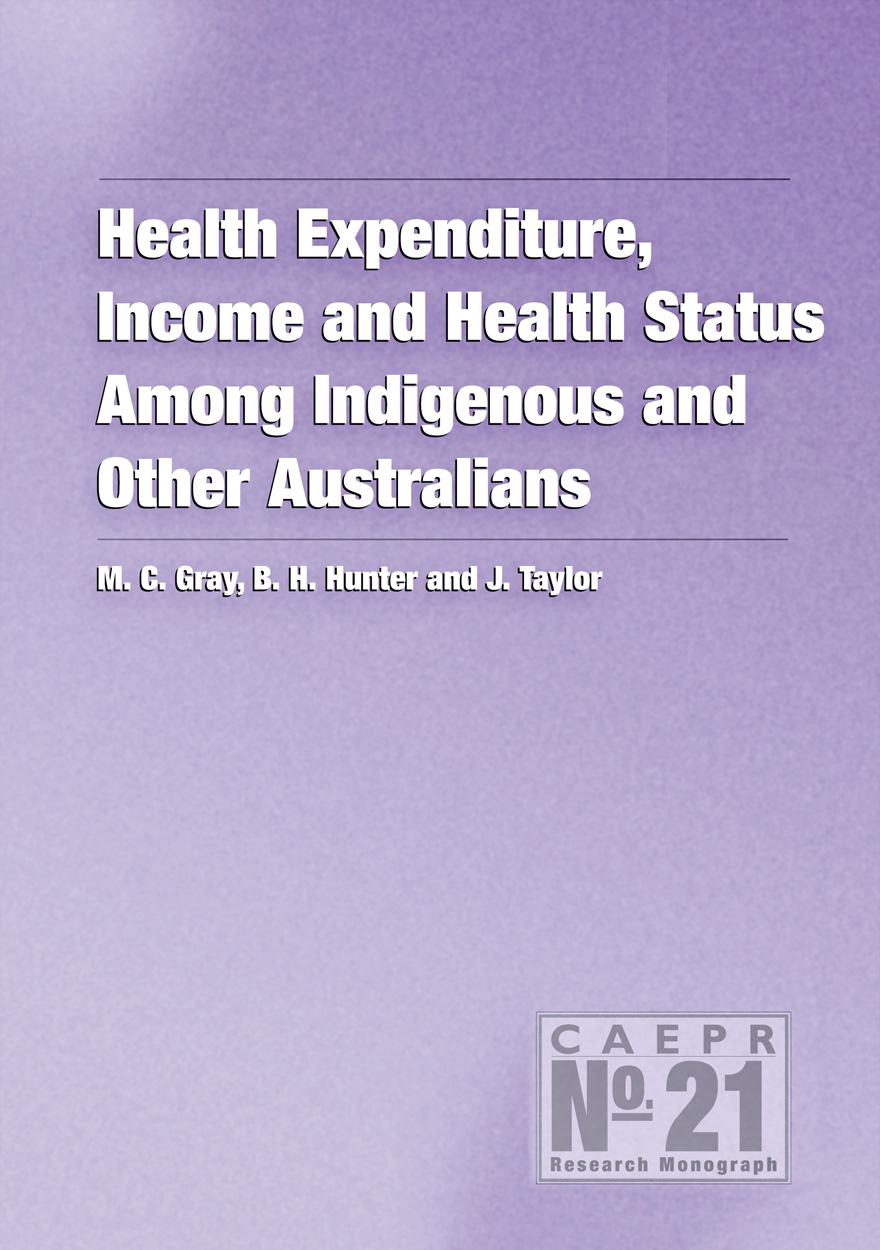
Health Expenditure, Income and Health Status Among Indigenous and Other Australians »
Publication date: August 2004
Using data from the 1995 National Health Survey (NHS) this study asks the question—what is the relationship between income, health expenditure and health status for the Indigenous and non-Indigenous populations in Australia? Income is generally seen as an indicator of ability to address the need for health expenditure, and as a factor in influencing health status. The expectation, therefore, is that income and health status are positively related.
The analysis measures differences in health expenditure and reported health status between the Indigenous and non-Indigenous populations, holding income level constant. No association is found between income and Indigenous health status. A number of explanations are canvassed. The finding may simply reflect poor data quality, both in terms of income and self-assessed health status. An alternative hypothesis, with long-term implications, is that adult mortality reflects foetal and childhood health, regardless of current income status.

Humanities Research Centre »
A history of the first 30 years of the HRC at The Australian National University
Authored by: Glen St John Barclay, Caroline Turner
Publication date: May 2004
‘This book may claim to be no more than a history of the HRC at ANU. It is, of course, much more than that. It is certainly an examination of the role and predicament of the humanities within universities and the wider community, and it contributes substantially to the ongoing debate on an Australian identity.’
Malcolm I. Thomis



